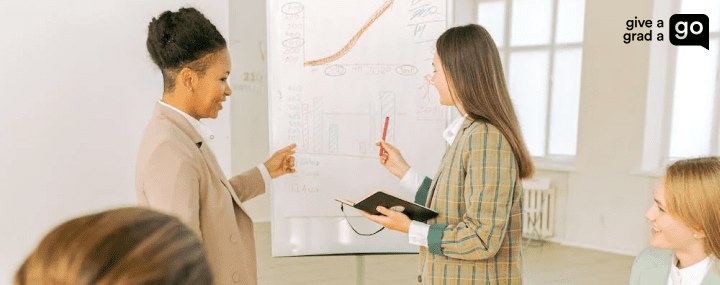A well-organised and objective-focused assessment day can offer a whole host of benefits for graduate recruitment.
Unlike standardised interview processes, assessment centre days have the scope to evaluate all aspects of a candidate’s personality, skills, culture fit and potential, so they present graduate employers with a golden opportunity – being able to differentiate between candidates who on paper can seem very similar.
Just as importantly, spending a full day with you will allow candidates to gain much more of an understanding of your company, the opportunity, and what they can expect from the role than they ever would have done in a standard one-on-one graduate interview.
What’s more, if the assessment day activities have been planned in advance, is well-executed, and includes a variety of activities and exercises, candidates will be likely to take home a positive view of your employer brand – regardless of their assessment day success rate.
Last year, Give a Grad a Go ran our own assessment day (which we decided to call an ‘Interview Workshop’), to promote teamwork and see how candidates worked together.
We wanted to ascertain how candidates would take to phone work, pitching and shortlisting, so the exercises we put together looked to assess both practical skills and behavioural traits.
Before the day itself, we sat down to pinpoint exactly what we were looking for in the ideal candidate, and then planned out, trialled and tested our exercises ready for the workshop.
Many members of our team were involved in different aspects of putting together and running the day, with a few taking seats on our interview panel.
Give a Grad a Go is a big believer in the value of assessment days for graduate recruitment, and especially the scope they provide for employers to evaluate different aspects of candidates’ skills and personality traits.
If you are planning to run your own candidate assessment day, creating and sticking to a structured timeline is the best place to start.
Not sure how to run an assessment day? Read the rest of our assessment day guide to learn from our experience and gain some top tips!

Before
For our assessment day prep, we made sure to define our objectives, by asking ourselves questions like ‘why are we hiring?’, ‘what is our end goal?’, and ‘what skills will the ideal candidate have?’.
Without deciding upon what key competencies we wanted to assess we knew that the day itself would be unfocused, so pinning down our objectives was absolutely essential.
Prior to the day, we put together a trusted interview panel to run the assessments, and made sure that everyone on this panel was on exactly the same page about what we were looking for.
We trialled a few different exercises, tasks and activities to be used on the day, including timed group exercises to see how well candidates would perform under pressure and as part of a team, and end-of-day presentations designed to test how well they could communicate their ideas to a large group.
Finally, we regrouped to create a structured timeline, which included the day’s start and end times, and factored in the exercises themselves, team talks and break times.
Thorough assessment day preparation is crucial for a successful assessment day.
On the day
On the morning of the assessment day, we sent all candidates the schedule we had already prepared so that they knew what to expect from the upcoming day.
Once the candidates had arrived and the day was in progress, we made sure to stick to our timeline throughout, giving 2-minute warnings when assessing candidates so they were aware of how much time they had to complete a task was almost up.
We felt it was important to speak to the candidates about the opportunity, as well as giving them valuable insight into what working at Give a Grad a Go is really like, so we encouraged candidates to ask questions, and had them speak to members of different teams throughout the day.
Finally, we made an assessment of candidates in a situation outside of working hours, to test how well they would fit in with our company culture, and to see how they interacted with the team and with each other.
After
The day after our Interview Workshop, our panel sat down to discuss each candidate, and as a group decided who was a good fit for both the role and the business.
We had already decided that if we wanted to hire a candidate, the vote would have to be unanimous – so this was an important part of the process.
Of the ten candidates we invited to our assessment day, three were successful and were offered a job with us soon after.
In the days following, we made sure to provide thorough and constructive feedback to all candidates regardless of whether they were successful or not, as we wanted to leave all the attendees with a great lasting impression of our business.
We kept in contact with our successful candidates and made sure that if they had a later start date they were kept in the loop and sent frequent updates.
Excited for the arrival of our new hires, we also made all the necessary preparations for their first days.
In the week following, we sat down to evaluate the successes and failures of the day, making note of what went particularly well and what we felt could be improved when we run another workshop in the future.
Although we know that our timeline will remain much the same, we wanted to evaluate how each of our exercises worked on the day to make sure that we are always getting the most out of each assessment.
On the day we had run a Business Development task, which we had purposely set up to be fairly informal in order to put candidates more at ease.
In turn, though, this informality made it difficult to accumulate tangible feedback that we could compare and contrast – and moving forward we know that if we run a task like this again it will need to have more structure in order to be of optimum value.
Now
A great assessment day is one that is well-planned and well-thought-out.
It will only be successful if you have a selection of enthusiastic and relevant candidates taking part.
If you would like to know more about how we could help streamline your graduate hiring then please get in touch!
Assessment centre questions
-
A UK assessment day can take many forms, depending on the company hosting the day and the role(s) that candidates are being assessed for.
In terms of an assessment day definition: It typically involves a combination of various assessment methods, such as assessment day group tasks, interviews, role-playing scenarios, presentations, and assessment day tests, to gauge a candidate’s performance in a simulated work environment.
The goal is to make informed decisions about hiring or promoting individuals based on their demonstrated competencies and behaviours during the assessment day activities.
Graduate assessment days are more likely to be focused on assessing a range of competencies and qualities relevant to entry-level positions. These may include:
Problem Solving: Assessing a candidate’s ability to analyse and solve complex problems.
Teamwork and Collaboration: Evaluating how well candidates work in teams, communicate, and contribute to group tasks.
Communication Skills: Assessing written and verbal communication skills, including the ability to convey ideas clearly and professionally. This is often evaluated by having candidates deliver an assessment day presentation.
Adaptability: Testing how well candidates can adapt to new situations, especially within a fast-paced and dynamic work environment.
Leadership Potential: Identifying individuals who can take charge and lead in various scenarios. This is often achieved through assessment day role play.
The benefit of an assessment day is that you can tailor it towards your hiring needs.
-
A virtual assessment day is an online or remote adaptation of the traditional assessment day, which is designed to evaluate candidates for job positions or development programs. In a virtual assessment day, all activities, assessments, and interactions take place through digital platforms and technology, eliminating the need for physical presence.
Key features of an online assessment day include:
Video Interviews: Assessment day interview questions are delivered through video conferencing platforms, allowing assessors to evaluate communication skills, interpersonal abilities, and other relevant competencies remotely.
Simulations and Exercises: Candidates may be asked to complete job-related exercises, case studies, or simulations via digital platforms to assess their problem-solving, decision-making, and job-specific skills.
Group Activities: Group exercises and teamwork assessments are facilitated through virtual collaboration tools and video conferencing, enabling the evaluation of teamwork, leadership, and collaboration skills.
Online Examiners: Trained assessors, often HR professionals or assessors within the organization, observe and evaluate candidates’ performance remotely, sometimes using technology to document and score their assessments.
There are lots of virtual assessment day benefits, including greater flexibility in scheduling, lower costs, and the ability to assess candidates from diverse geographic locations or those with a disability.
However, it’s important for both employers and candidates to adapt to the unique online assessment day disadvantages, including technical issues, the struggle for clear communication, and how hard it is to ensure a fair and standardised assessment process.
-
Here are some common assessment day example activities:
Group Exercises:
For group discussions, candidates are given a topic or scenario to discuss and are evaluated on their communication, collaboration, and problem-solving skills. Candidates can work together to solve a complex problem, demonstrating teamwork and critical thinking.
In-Tray or E-Tray Exercises:
Candidates prioritise and respond to a series of emails, tasks, or documents, simulating the daily demands of the job. This assesses organisational and time-management skills.
Presentation:
Candidates are asked to prepare and deliver a presentation on a given topic, testing their ability to communicate, persuade, and present effectively.
Interviews:
Structured one-on-one or panel interviews where candidates discuss their qualifications, experience, and motivations for the position.
If you’re looking for assessment day tips, our advice would be to ensure that your assessment day covers a wide variety of activities to allow candidates of different strengths to shine; A candidate who is outspoken in a group scenario may be intimidated by a presentation task.
Looking to find graduates to hire for your business? We are the top UK recruiting agency for grads – please contact our team today to find out more about our services.







